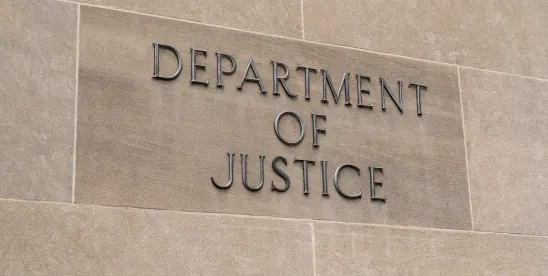On Monday June 9, 2025, the Deputy Attorney General Todd Blanche released “Guidelines for Investigations and Enforcement of the Foreign Corrupt Practices Act.” This much anticipated update directly responds to Executive Order 14209, signed by President Trump earlier this year, which temporarily paused Foreign Corrupt Practices Act (FCPA) enforcement. The new Guidelines focus FCPA enforcement going forward on protecting U.S. business interests, furthering the Administration’s efforts to stamp out cartels and transnational criminal organizations, and prioritizing prosecution of individuals rather than corporations. Conduct that can be described as “routine business practices” in foreign countries, under the Guidelines, will not be pursued.
The Guidelines reference and closely mirror Executive Order 14209 (EO) which stated that the FCPA should not be “stretched beyond proper bounds and abused in a manner that harms the interests of the United States,” or enforced in a manner that “harms American economic competitiveness and, therefore, national security.” EO, § 1. The EO reflected the Administration’s concern that FCPA enforcement created a competitive disadvantage abroad and instructed the Department of Justice (DOJ) to stop all new FCPA proceedings for 180 days, review ongoing FCPA matters to ensure alignment with U.S. interests, and issue updated guidelines for investigation and enforcement.
Now that the Guidelines have been issued, it is clear the DOJ will continue to enforce the FCPA but with more focus on industries that touch on the Administration’s foreign policy goals (like defense, critical infrastructure, and strategic resources) and foreign companies competing with U.S. companies.
The New Approach Set Forth in the Guidelines
1. Approval to Initiate FCPA Cases
The Guidelines require that all new FCPA cases must be authorized by the Assistant Attorney General for the Criminal Division, or a more senior official. This new approval process means that top DOJ leadership will be keeping a watchful eye on line prosecutors to ensure adherence to the priorities described in the Guidelines.
2. The Principal Factors in Prosecution Decisions
The Guidelines set out four factors for prosecutors to consider when deciding whether to investigate or prosecute a potential FCPA violation. The Guidelines repeatedly state that these factors are not exhaustive and “myriad factors must be considered when determining whether to investigate or prosecute.” It is clear, however, that these four substantive issues will undoubtedly receive significant attention in charging decisions and resolutions. All existing FCPA actions will be reviewed under these parameters within the next 180 days, and all future actions will be governed by these Guidelines.
a. Combating Cartels and Transnational Criminal Organizations
A primary consideration in deciding whether to pursue an FCPA action under the new Guidelines is whether the alleged conduct is linked to a cartel or transnational criminal organization.
b. Protecting U.S. Business Opportunities
Prosecutors are now directed to target conduct that “deprived specific and identifiable U.S. entities of fair access to compete” or resulted in economic harm to U.S. companies or individuals. This may prompt U.S. based companies to report potential FCPA violations in situations, for an example, when a foreign competitor secures a contract from a foreign government in a bidding process.
c. National Security Considerations
The third factor prosecutors are to consider under the Guidelines is whether the alleged misconduct undermines U.S. national security by preventing the U.S. or American companies from accessing strategic business sectors. The Guidelines reference the EO’s focus on “critical minerals, deep-water ports, or other key infrastructure or assets.” The clear goal is to use the FCPA to prevent threats to national security caused by bribing corrupt foreign officials in these key strategic sectors.
d. “Serious Misconduct”
The Guidelines discourage – and likely will entirely stop the investigation of any routine, business practices and minor gifts or hospitality. Instead, the DOJ will focus on major bribery schemes, evidence of concealment or obstruction, and cases with strong indicia of corrupt intent tied to specific individuals. The Guidelines also leave room for prosecutors to make enforcement decisions based on the likelihood (or lack thereof) of foreign law enforcement actions.
What Happens Next?
The FCPA Guidelines are just one of the many changes to the Administration’s policies on investigation and enforcement of white collar crime. Matthew Galeotti, head of the Justice Department’s Criminal Division, said at an anti-corruption conference in New York on Tuesday “the through-line is that these Guidelines require the vindication of U.S. interests.”
This means that companies should consider reassessing their risk in the areas now prioritized by the DOJ, especially when doing business in regions with significant cartel activity, and transactions related to strategic business sectors. Companies should update compliance programs to ensure they are tailored to address the specific factors identified in the Guidelines and in line with global anti-bribery laws. Additionally, companies should be cognizant of the focus on individual accountability when conducting internal investigations and shape compliance programs to identify culpable individuals and take appropriate action.
Companies should also be aware that these Guidelines are just that, guidelines. They create no enforceable rights, and the FCPA is still the law of the land and has a minimum five-year statute of limitations. Maintaining a compliance program that complies with the FCPA to its fullest extent remains as vital as ever.





 />i
/>i

